
Being taken round a New Zealand hospice I was amused and, let’s admit it, thrilled to see a well-worn copy of the book, its hard cover almost falling off. “Well used !” I said to the doctor. “ Yes indeed” he said: “perfect for holding up the old piano!” Thankfully he then pointed to two other copies, in pristine condition, on a shelf with the Bible. “We actually call it the Bible of Palliative Care” he said, “that’s why it is up there.”
Recalling the excitement
I cannot recall how I came to be its first Editor-in-Chief*. What I do recall is the excitement when two friends (Geoffrey Hanks and Neil Macdonald) agreed to be Co-Editors – both distinguished physicians who had moved from their specialties into palliative medicine, teachers, professors, and researchers with long lists of published papers, and both well-known internationally. We were soon aware of what a task we had taken on and what friends we now had in Oxford University Press.
From the start it was to be a reference book and not a “Do It Yourself” handbook. As far as was possible every assertion, every recommendation would be supported by scientific evidence. It was for an international readership, primarily for doctors but hopefully of interest to nurses, social workers, ‘professions allied to medicine’, health care planners, ethicists, and pastoral care workers, worldwide. We decided that contributors should be the best we knew of whether or not they were UK-based. It never crossed our mind that anyone might decline our invitation, but several did. Predictably some were too busy, others felt they were not “writers”, a few took exception to their chapters being edited, and a few did not want to be associated with something “far too big, sure to be expensive, will never succeed, certain to fail!”
The topics were then put into sections, each with a section editor directly accountable to one of the three Co-Editors. Copies of each contribution, from the earliest stage to the final stage, were read by the Co-Editors. It proved a success and before we had time to recover we were being invited to prepare a 2nd Edition.
Issues we faced
It is perhaps worth recalling issues we had not expected or bargained for. For example we needed a glossary because of different names given to people and places in different countries, for example the British GP is the American Family Physician, the British physiotherapist is an American kynesthetist, the UK paracetamol is the American acetaminophen. In Britain we have Out-Patients, in America Ambulatory Care. The list is a long one.
With hindsight we should have realised that few GPs or even health centres would buy a copy or that several would accuse us of “ideas of grandeur” devoting a large textbook to an important but very small part of general practice. One of their letters did however make us smile. “None of my dying patients has ever come back to complain about my care!”
The saddest letters we got were from isolated colleagues, doctors and nurses, with no-one to turn to when confronted by a patient in what seemed like intractable pain or those hundreds or thousands of doctors in countries where opioids were unobtainable or legally restricted (incidentally many of them renowned for their health services.)
Has it changed things?
The publication of the 5th edition has now taken place. What an honour this has been. Has it changed medical practise? Has it made us more sensitive, better listeners? It has certainly stimulated research.
Of course, it was not the first book on hospice/terminal care. What made it unique was its comprehensiveness (and size), its research-base, its international authorship and its target readership – every doctor who in the course of his or her work is called upon to care for the dying, whatever their illness, their colour, their means or their faith.
Derek Doyle
* Doyle D, Hanks GWC, MacDonald N, eds. (1993). Oxford Textbook of Palliative Medicine, 1st ed. Oxford: Oxford University Press.
663 words

